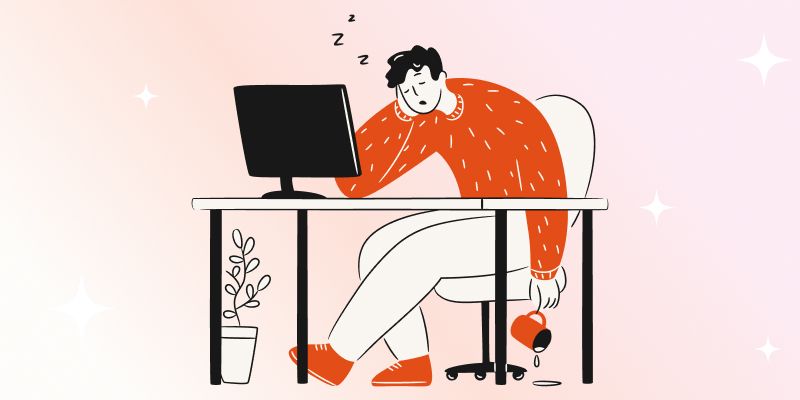Why Do Some of Us Find Working From Home More Stressful Than the Office?

Remote working can have some great benefits for work-life balance. If you've only recently had the opportunity to work from home, you probably had visions of having plenty of extra time, right? Not to mention the time and money you can save when you're not commuting daily. Working from home can be a dream for many people but for others, it can be a major source of stress.
Research from 15 countries found that over 40% of people who spent a lot of time working from home reported being highly stressed. This was quite a bit higher than their on-site counterparts, with 25% of those self-reporting as being super stressed. In many cases, this isn't just a feeling. According to one study, being at home can contribute to higher cortisol levels compared to working in an office. Cortisol is a hormone important for our body but it can be elevated during times of stress. So, what is it about a work-from-home setup that can cause a ton of stress for some people?
There is a whole heap of factors that can play a part.
Factor #1: Lack of Structure
When you work from home, there’s a lot more flexibility to your schedule. This lack of structure can make it hard to know when to call it quits for the day. It’s super common to feel obliged to work for a lot longer than you would in an office and that can be hugely stressful. The end result? You’re working longer and harder and being less productive, especially if you’re dealing with a ton of distractions that cut into work hours. This can make it a real challenge to achieve your work goals. Setting a schedule will go a long way toward avoiding this. See 5 Tips to Build Better Focus with Executive Function Skills.

Factor #2: Blurred Boundaries Between Work and Home Life
Since you’re working in your home, it’s super common to have hugely blurred lines between your home life and your work life. One of the biggest issues? Switching off from family life and being able to separate both areas of your life. Working from home means you're constantly surrounded by a ton of visual reminders of the work-family conflict this can result in. There’s a ton of research to suggest that working from home can exaggerate family conflict, especially if it’s already lurking in the background. According to a study by the Rensselaer Polytechnic Institute, many people who are working from home are more stressed than they would be in an office — largely due to this conflict.
Another study suggests that mental and physical fatigue can be exaggerated if you're already fighting a losing battle with balancing work and family life. But if there isn't a ton of existing conflict, it's a whole heap less likely to cause big problems.
Factor #3: Feeling Compelled to Work Longer
There can be a ton of pressure to look hugely productive and busy since you're not physically in an office. This can make you feel you have to be available all the time or prove how hard you're working. It's majorly anxiety-inducing and can leave you permanently on edge. Technology is a huge culprit for this, especially if your time is being tracked or you constantly feel compelled to check if your work is contacting you. If you’re receiving notifications on your personal smartphone every time a work email comes in, it can be super challenging to ignore it — even if it arrives early in the morning or late at night. This can make it hugely difficult to fully switch off and it can affect your sleep patterns too.
How to stop doom-scrolling? Setting boundaries is super crucial to avoid making your work-from-home experience miserable.

Factor #4: Lack of Social Interaction
It can be a whole heap easier to focus when you’re working from home, especially if you’d often be disrupted by other people in an office. And if you loathe your co-workers, working from home and being truly alone is the ultimate dream. But this solitude can be a major downside for many people. If you really love social interaction with co-workers, the relative isolation of working from home can feel hugely stressful. Even if you didn't love your interactions with your co-workers, working from home can quickly become isolating. You can counteract this by trying to organize as many face-to-face interactions as you can (even if they have to be socially distanced while Covid-19 is still a threat).
Making Working From Home Less Stressful
As we discussed, tons of factors that affect how stressful (or otherwise!) you find working remotely.
Your home setup, personality, and the nature of your job duties can all play a super important role, for example.
But as a general rule of thumb, working from home can be a ton less stressful if you have structure and boundaries and take opportunities for decreasing isolation. Working with a certified health coach can help you set goals for having productive working hours, prioritizing your work day, setting healthy boundaries, and making sure that your remote position is contributing to work-life balance and not increasing your stress levels!

Comments ()